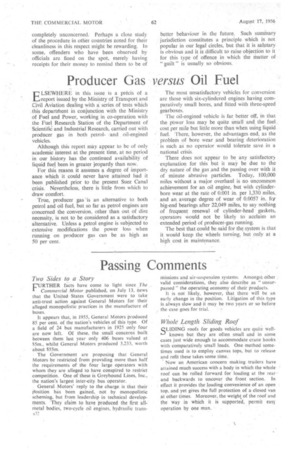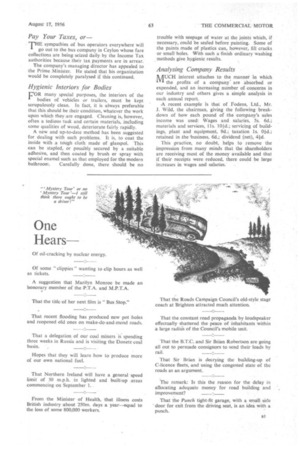Passing Comments
Page 34

Page 35

If you've noticed an error in this article please click here to report it so we can fix it.
Two Sides to a Story
FURTHER facts have come to light since The Commercial Motor .published, on July 13, news that the UnitedStates Government were to take anti-trust action against General Motors for their alleged monopolistic practices in the manufacture of buses.
It appears that, in 1955, General Motors produced 85 per cent. of the nation's vehicles of this type. Of a field of 24 bus manufacturers in 1925 only four are now left. Of these, the small concerns built between them last year only 406 buses valued at 55m., whilst General Motors produced 3.233, worth about 555m.
The Government are proposing that General Motors be restricted from providing more than half the requirements of the four large operators with whom they are alleged to have conspired to restrict competition. One of these is Greyhound Lines, Inc., the nation's largest inter-city bus operator. General Motors' reply to the charge is that their rfosition has been gained, not by monopolistic scheming, but from leadership in technical developments. They claim to have produced the first allmetal bodies, two-cycle oil engines, hydraulic trans
32
missions and air-suspension systems. Amongst other valid considerations, they also describe as " unsurpassed" the operating economy of their products. It is not likely, however, that there will be an early change in the position. Litigation of this type is always slow and it may be two years or so before the case goes for trial.
Whole Length Sliding Roof
SLIDING roofs for goods vehicles are quite wellknown but they are often small and in some cases just wide enough to accommodate crane hooks with comparatively small loads. One method sometimes used is to employ canvas tops, but to release and refit these takes some time.
Now an American concern making trailers have attained much success with a body in which the whole roof can be rolled forward for loading at the rearand backwards to uncover the front section. In effect it provides the loading convenience of an open top, and yet gives the full protection of a closed van
• at other times. Moreover, the weight. of the roof and the way in which it is supported, permit easy operation by one man. Pay Your Taxes, or— THE sympathies of bus operators everywhere will go out to the bus company in Ceylon whose fare collections are being seized daily by the Income Tax authorities because their tax payments are in arrear. The company's managing director has appealed to the Prime Minister. He stated that his organization would be completely paralysed if this continued.
Hygienic Interiors for Bodies
FOR many special purposes, the interiors of the
bodies of vehicles or trailers, must be kept scrupulously clean. In fact, it is always preferable that this should be their condition, whatever the work upon which they are engaged. 'Cleaning is, however, often a tedious task and certain materials, ineluding some qualities of wood, deteriorate fairly rapidly.
A new and up-to-date method has been suggested for dealing with such problems. It is, to coat the inside with .a tough cloth made of glasspol. This can •be stapled, or possibly secured by a suitable adhesive, and then coated by brush or spray with special enamel such as that employed for the modern bathroom. Carefully done, there should be no trouble with seepage of water at the joints which, if necessary, could be sealed before painting. Some of the paints made of plastics can, however, fill cracks or small holes. With such a .finish ordinary washing methods give hygienic results.
Analysing Company Results
mucH interest attaches to the manner in which iv I the profits of a company. are absorbed or expended, and an increasing number of concerns in our industry and others gives a simple analysis in each annual report.
A recent example is that of Fodens, Ltd., Mr. J. Wild, the chairman, giving the following breakdown of how each pound of the company's sales income was used: Wages and salaries, 5s. 6d.; materials and services, I Is. 101d.; servicing of buildings, plant and equipment, 9d.; taxation Is. 0/d.; retained in the 'business, 6d.; dividend (net), 4/d.
This practice, no doubt, helps to remove the impression from many minds that the shareholders are receiving most of the money available and that if their receipts were reduced, there could be large increases in wages and salaries.




































































































